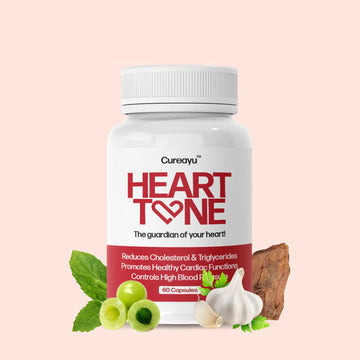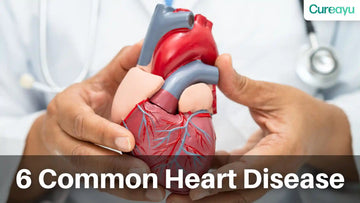Heart attack is a serious medical emergency that occurs when there is a blockage in blood flow to the heart. Being aware that there are various stages of heart attack can be helpful in terms of early detection, prevention and management. This blog forwards to the way a heart attack happens, in steps, and what should be done after a heart attack to get well.
Also Read: 6 Common Heart Disease: Early Symptoms, Causes and Treatment
What Happens During a Heart Attack?
A heart attack, clinically called a myocardial infarction, occurs when the blood flow to the heart muscle is greatly reduced or fully obstructed. The main cause behind it is the accumulation of fatty deposits (plaques) in the coronary arteries. Here are the key causes:
Plaque Formation (Atherosclerosis): Over time, fatty deposits build up in arteries, narrowing them and limiting blood flow to the heart.
Blood clots: If a plaque ruptures, this can activate blood clotting, which can further occlude the artery.
Coronary Artery Spasm: A temporary reduction in diameter of the coronary artery can decrease or stop blood flow for a short period of time, frequently caused by stress, the use of tobacco, or drug use.
High Blood Pressure: High pressure in the arteries can injure the inner walls, making them more susceptible to morphological changes and deposition of plaques.
Diabetes: Increased blood sugar levels damage the arteries and lead to an increased risk of heart disease.
Obesity and Sedentary Lifestyle: Extra weight and inactivity cause the heart to work harder.
Smoking and Heavy Drinking: Both habits weaken blood vessels and raise the risk of a heart attack.
Stages of a Heart Attack
There are several stages that a heart attack goes through, so there are a variety of warning signs. These stages can aid in seeking timely medical intervention.
Recognizing Early Signs of a 1st Stage Heart Attack
This is the "pre-heart attack" stage that can happen days or weeks before a heart attack. Symptoms may include:
-
Minor chest pain which comes and goes.
-
Tiredness and unusual fatigue, particularly in women.
-
Difficulty breathing during normal activities.
-
Nausea or indigestion — stomach symptoms.
-
Sudden cold sweats, with no discernible explanation.
-
Dizziness or lightheadedness.
Second Stage of Heart Attack On Set
During the heart attack process, symptoms will increase and be more extreme, and require immediate medical attention.
-
Intense chest pain or pressure that moves to the arm, back, or jaw.
-
Cold sweats and clammy skin.
-
Difficulty breathing even while at rest.
-
Extreme fatigue and weakness.
-
Dizziness or fainting.
Stage 3 of Heart Attack: The Full Symptom of Heart Attack
This means the heart starts having a lack of oxygen and if not treated can cause permanent damage to the heart muscle.
-
Severe chest pain that does not resolve with rest.
-
Abnormal heartbeat or palpitations.
-
Transient loss of consciousness due to insufficient blood flow.
-
Shortness of breath or the feeling that you are choking.
4th Stage of Heart Attack: Medical Intervention
When someone arrives at the hospital in time, doctors will quickly take steps to restore blood flow.
-
Use of clot-busting drugs or blood thinners.
-
An angioplasty to clear clogged arteries.
-
Insertion of a stent, a small tube that helps to keep arteries open.
-
Severe cases require emergency bypass surgery.
5th Stage of Heart Attack: Recovery & Post-Heart Attack Care
Post-heart attack care is important after the immediate danger has passed for long-term health of the heart.
-
Exercise therapy, or cardiac rehabilitation, to recondition the heart muscle.
-
Management with medications for cholesterol, blood pressure, and heart function
-
Changes in lifestyle, e.g., diet and exercise.
-
Support for emotional well-being to help manage stress and anxiety.
Also Read: The Different Types of Heart Attacks: A Comprehensive Guide to Heart Health
What to Do After a Heart Attack — and What Not to Do
Heart attack recovery is both a medical and lifestyle prescription. Here’s what to do for a smooth recovery:
-
Stay consistent with your doctor’s recommendations and take any prescribed medications regularly.
-
Eat a heart-healthy diet with plenty of fiber, healthy fats, and lean protein.
-
Exercise if recommended by your physician.
-
Stop smoking and cut back on alcohol.
-
Keep an eye on your blood pressure, cholesterol and blood sugar.
-
Continuously monitor progress at regular follow-up appointments.
Also Read: Understanding the Silent Killer: What Is Cardiac Arrest, Its Signs, Causes, and Emergency Response
Maintaining Heart Health What’s Good for the Heart
Steps you can take to reduce your risk. Here are some heart-healthy habits to follow:
-
Eat a nutritious diet: Include heart-healthy foods such as whole grains, fruits & vegetables, lean proteins, and healthy fats.
-
Do Go Out in Nature: Get at least 30 mins of moderate physical activity (a walk, a cycle ride, etc) most days.
-
Stress Management: Engage in relaxation practices such as meditation, deep breathing, or yoga.
-
Blood Pressure and Cholesterol Check: Regular screenings are key to early detection and prevention of heart disease.
-
Stop Smoking and Cut Back on Alcohol: Both are major increases in heart disease risk.
-
Maintain a Healthy Weight: Being overweight adds extra stress to the heart and decentralizes conditions.
-
Integrate Ayurvedic Supplements: Natural treatments can help with heart health.
Cureayu Heart Tone – Best Ayurvedic Heart Supplement
Cureayu Heart Tone Capsules: For people looking to improve heart health naturally. Ingredients: Arjuna, Amla, Tulsi, Giloy, Dalchini, Garlic, Ginger, Parwal, Pushkarmool, and Gotu Kola. Heart Tone Capsules provide a one-of-a-kind blend of soothing nutrients that help to promote overall cardiovascular health.
Final Words
Heart attack can be a life-altering situation but through prompt recognition, timely treatment and necessary lifestyle changes, you can save your heart and live a healthy life. Therefore taking preventive measures like adopting a healthy lifestyle including a balanced diet, exercise, stress management and natural supplements such as Cureayu Heart Tone can greatly help in preventing heart conditions from developing further in the future. Keep reading, be proactive, and take heart in your heart health!











